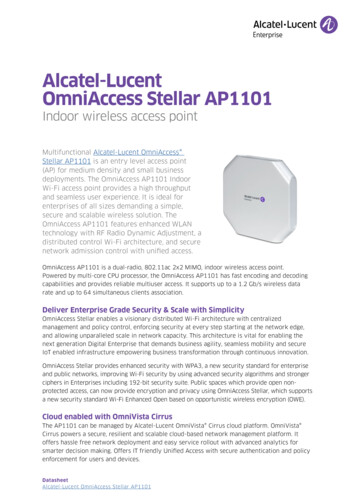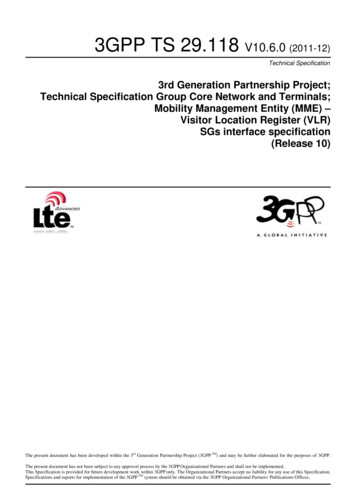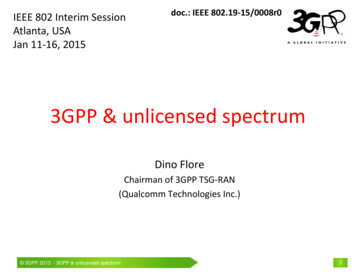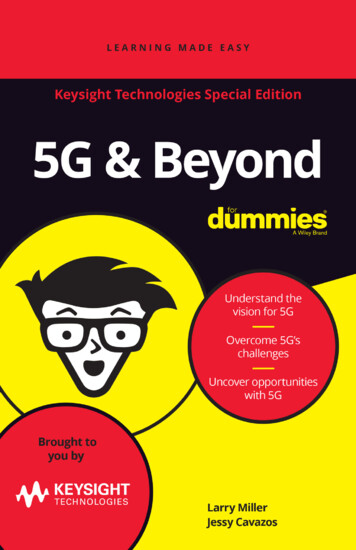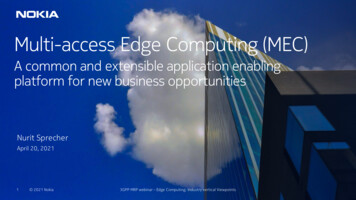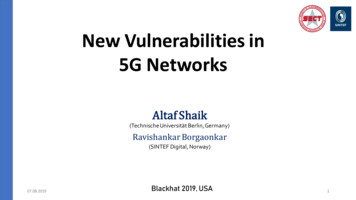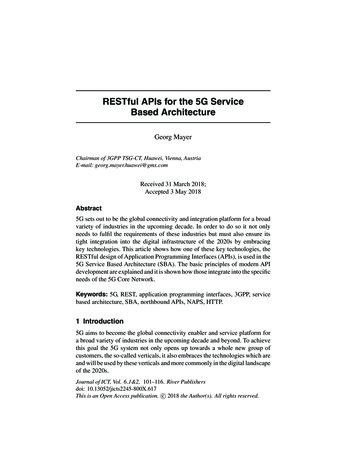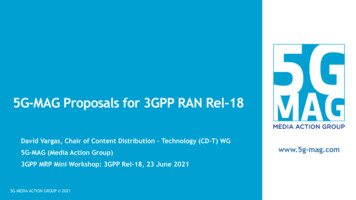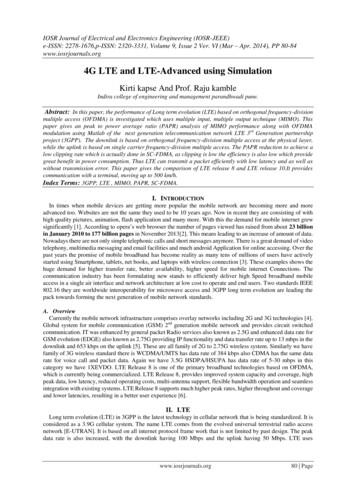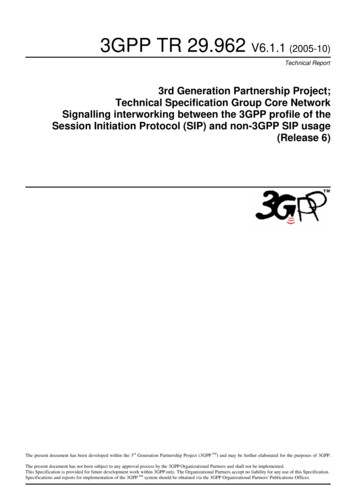
Transcription
3GPP TR 29.962 V6.1.1 (2005-10)Technical Report3rd Generation Partnership Project;Technical Specification Group Core NetworkSignalling interworking between the 3GPP profile of theSession Initiation Protocol (SIP) and non-3GPP SIP usage(Release 6)The present document has been developed within the 3rd Generation Partnership Project (3GPP TM) and may be further elaborated for the purposes of 3GPP.The present document has not been subject to any approval process by the 3GPP Organizational Partners and shall not be implemented.This Specification is provided for future development work within 3GPP only. The Organizational Partners accept no liability for any use of this Specification.Specifications and reports for implementation of the 3GPP TM system should be obtained via the 3GPP Organizational Partners' Publications Offices.
Release 623GPP TR 29.962 V6.1.1 (2005-10)KeywordsUMTS, Network, SIP, Interworking3GPPPostal address3GPP support office address650 Route des Lucioles - Sophia AntipolisValbonne - FRANCETel.: 33 4 92 94 42 00 Fax: 33 4 93 65 47 16Internethttp://www.3gpp.orgCopyright NotificationNo part may be reproduced except as authorized by written permission.The copyright and the foregoing restriction extend to reproduction in all media. 2005, 3GPP Organizational Partners (ARIB, ATIS, CCSA, ETSI, TTA, TTC).All rights reserved.3GPP
Release 633GPP TR 29.962 V6.1.1 (2005-10)ContentsForeword .51Scope .62References .63Definitions and Abbreviations .73.13.2Definitions. 7Abbreviations . 74Session setup from calling 3GPP UA towards called non-3GPP UA .74.14.2.14.2.24.2.34.34.3.14.3.24.3.3Session setup towards a non-3GPP UA not making use of the SIP 100rel extension, the SIP preconditionsextension and the SIP update extension. 8Description of interworking issue. 8Proposed Resolution B2BUA . 8Proposed Resolution Modified end-to-end call flow . 13Session setup towards a non-3GPP UA not making use of the SIP preconditions extension and the SIPupdate extension . 15Description of interworking issue. 15Proposed resolution B2BUA. 15Proposed resolution modified end-to-end call flow . 20Session Setup towards non-3GPP UA not making use of the SIP preconditions extension. 22Description of interworking issue. 22Proposed Resolution B2BUA . 22Proposed Resolution Modified end-to-end call flow . 225Session setup from calling non-3GPP UA towards called 3GPP UA .225.1Session Setup from non-3GPP SIP UA not making use of the SIP 100rel extension, the SIP preconditionsextension and the SIP update extension . 23Description of interworking issue. 23Proposed Resolution B2BUA . 23Proposed Resolution Modified end-to-end call flow . 26Session setup from non-3GPP SIP UA not making use of the SIP preconditions extension and the SIPupdate extension . 29Description of interworking issue. 29Proposed resolution B2BUA. 30Proposed Resolution Modified end-to-end call flow . 31Session setup from non-3GPP UA not making use of the SIP preconditions extension . 33Description of interworking issue. 33Proposed Resolution B2BUA . 34Proposed Resolution Modified end-to-end call flow . 2.35.35.3.15.3.25.3.366.16.2Implications of the Proposed Solutions.34B2BUA. 34Modified end-to-end call flow. 35Annex A:A.1A.2Interworking topic template .36Description of interworking issue. 36Proposed Resolution yy . 36Annex B:Mechanisms allowing optional Additions within SIP .37Annex C:Impacts of Session Setup Call flows where SIP extensions mandated by 3GPP arenot applied. .40C.1Impacts of session setup call flows from calling 3GPP UA.40C.1.1C.1.1.1C.1.1.2Session setup towards non-3GPP UA not making use of the SIP 100rel extension, the SIP preconditionsextension and the SIP update extension. 40Description of interworking issue. 40Impacts of Identified interworking issue . 423GPP
Release 6C.1.2C.1.2.1C.1.2.2C.1.3C.243GPP TR 29.962 V6.1.1 (2005-10)Session Setup towards non-3GPP UA not making use of the SIP preconditions extension and the SIPupdate extension . 42Description of interworking issue. 42Impacts of identified interworking issue. 43Session setup towards non-3GPP UA not making use of the SIP preconditions extension . 44Impacts of session setup towards called 3GPP n-3GPP SIP UA not making use of the SIP 100rel extension, the SIP preconditions extension and theSIP update extension. 44Description of interworking issue. 44Impacts of identified interworking issue. 45Non-3GPP SIP UA not making use of the SIP preconditions extension and the SIP update extension . 46Description of interworking issue. 46Impacts of identified interworking issue. 47Non-3GPP UA not making use of the SIP preconditions extension . 47Annex D:Reference call flow from 3GPP UA to 3GPP UA.48Annex E:Scenarios without identified interworking issues.50E.1Calling non-3GPP UA supporting the 100rel SIP extension, the SIP preconditions extension andthe SIP update extension, but not performing QoS reservation, to called 3GPP UA.51E.2Calling non-3GPP UA supporting the 100rel SIP extension, the SIP preconditions extension andthe SIP update extension, but not including the SDP offer in the initial INVITE request, to called3GPP UA.51Annex F:Change history .533GPP
Release 653GPP TR 29.962 V6.1.1 (2005-10)ForewordThis Technical Report has been produced by the 3rd Generation Partnership Project (3GPP).The contents of the present document are subject to continuing work within the TSG and may change following formalTSG approval. Should the TSG modify the contents of the present document, it will be re-released by the TSG with anidentifying change of release date and an increase in version number as follows:Version x.y.zwhere:x the first digit:1 presented to TSG for information;2 presented to TSG for approval;3 or greater indicates TSG approved document under change control.y the second digit is incremented for all changes of substance, i.e. technical enhancements, corrections, updates,etc.z the third digit is incremented when editorial only changes have been incorporated in the document.3GPP
Release 6163GPP TR 29.962 V6.1.1 (2005-10)ScopeThe present document investigates the SIP signalling interworking between entities of IM CN subsystems behaving asspecified in the 3GPP profile of SIP and SDP in 3GPP TS 24.229 [1], with related call flow examples in3GPP TS 24.228 [2], and SIP network entities external to the IM CN subsystems, which may not adhere to the 3GPPprofile of SIP and SDP.The present document assumes that GPRS access and service based local policy using the Go interface is applied.Non-GPRS access to IMS may have implications on the TR, which are not yet discussed.The considered SIP network entities external to the IM CN subsystems may feature different SIP capabilities, such asthe support of arbitrary SIP options.The document focuses on scenarios where the non-3GPP UA does not support one or more of the following SIPextensions:Preconditions:"Integration of Resource Management and SIP" RFC 3312 [5];Update:"The Session Initiation Protocol UPDATE Method" RFC 3311 [7];100rel:"Reliability of Provisional Responses in SIP" RFC 3262 [6].The present document focuses on the preconditions, the update and 100rel extensions because only these extensionsimply interworking issues since they require the end-to-end cooperation of both UAs.Security interworking may also have implications on the TR, which are not yet discussed.The present document does not make any a priori assumptions where a possible interworking is performed within theIM CN subsystem. Any SIP network entity within the IM CN subsystem may take part in the interworking. Thenetwork entities that may become involved in a certain interworking topic are identified for each of these topicsseparately.The present document features a discussion of topics, where an interworking is possibly required. Aspects of the 3GPPprofile of SIP and SDP, which obviously do not require any interworking, are not discussed. An assessment of theimpact and probability of occurrence of the discussed scenarios is also provided.Problems due to network elements within the IM CN subsystem, which do not or only partly satisfy the 3GPP profile ofSIP and SDP, in particular non 3GPP compliant SIP UAs, are out of scope of the present document.The present document is dedicated exclusively to issues inherent in the SIP and SDP signalling. Related topics in awider sense, such as IPv6 to IPv4 address translation or user plane transcoding are out of scope.For brevity, in what follows the above SIP extensions are only mentioned if a SIP UA does not make use of them.Otherwise, it is understood that the UA makes use of them.2ReferencesThe following documents contain provisions which, through reference in this text, constitute provisions of the presentdocument. References are either specific (identified by date of publication, edition number, version number, etc.) ornon-specific. For a specific reference, subsequent revisions do not apply. For a non-specific reference, the latest version applies. In the case of a reference to a 3GPP document (includinga GSM document), a non-specific reference implicitly refers to the latest version of that document in the sameRelease as the present document.[1]3GPP TS 24.229: "IP Multimedia Call Control Protocol based on SIP and SDP; Stage 3".3GPP
Release 673GPP TR 29.962 V6.1.1 (2005-10)[2]3GPP TS 24.228: "Signalling flows for the IP multimedia call control based on SIP and SDP;Stage 3".[3]3GPP TS 23.228: "IP Multimedia Subsystem (IMS); Stage 2".[4]IETF RFC 3261: "SIP: Session Initiation Protocol".[5]IETF RFC 3312: "Integration of Resource Management and Session Initiation Protocol (SIP)".[6]IETF RFC 3262: "Reliability of Provisional Responses in Session Initiation Protocol (SIP)".[7]IETF RFC 3311: "The Session Initiation Protocol (SIP) UPDATE Method".[8]IETF RFC 3264: "An Offer/Answer Model with Session Description Protocol (SDP)".[9]3GPP TS 29.208: "End to end Quality of Service (QoS) signalling flows".[10]3GPP TS 32.225: "Telecommunication management; Charging management; Charging datadescription for the IP Multimedia Subsystem (IMS)".[11]3GPP TS 29.207: "Policy control over Go interface".3Definitions and Abbreviations3.1DefinitionsFor the purposes of the present document, the terms and definitions given in 3GPP TS 24.229 [1], RFC 3261 [4] and thefollowing apply:3GPP profile of SIP: specification of the usage of SIP within 3GPP networks in 3GPP TS 24.229 [1].SIP-preconditions extension: SIP and SDP "precondition" extensions, as defined in RFC 3312 [5]SIP update extension: SIP "update" extension, including the SIP "UPDATE" method, as defined in RFC 3311 [7]SIP 100rel extension: SIP "100rel" extension, including the SIP "PRACK" method, as defined in RFC 3262 [6]Not making use of the SIP 100rel extension: the UA is either supporting the SIP 100rel extension but not willing touse it, or not supporting it at all.Not making use of the SIP update extension: the UA is either supporting the SIP update extension but not willing touse it, or not supporting it at all.Not making use of the SIP precondition extension: the UA is either supporting the SIP precondition extension but notwilling to use it, or not supporting it at all.3.2AbbreviationsFor the purposes of the present document, the abbreviations given in 3GPP TS 24.229 [1] and RFC 3261 [4] apply.4Session setup from calling 3GPP UA towards callednon-3GPP UAEach topic is contained in its own subclause with the structure defined in annex A.The following scenarios are not considered, since they are not compliant with RFC 3312 [5], clause 11: Session Setup towards non-3GPP UA not making use of the SIP 100rel extension.3GPP
Release 683GPP TR 29.962 V6.1.1 (2005-10) Session Setup towards non-3GPP UA not making use of the SIP update extension. Session Setup towards non-3GPP UA not making use of the SIP 100rel extension and the SIP update extension.A UA that supports the SIP preconditions extension shall also support the SIP 100rel extension and the SIP updateextension. Therefore it includes the "precondition" tag in the Require or in the Supported header, the "100rel" tag in theSupported header and the "Update" tag in the Allow header.4.1Session setup towards a non-3GPP UA not making use ofthe SIP 100rel extension, the SIP preconditions extensionand the SIP update extension4.1.1 Description of interworking issueSince the originating 3GPP UA requires the SIP precondition extension in the SIP INVITE request, the call will fail.P-CSCF A3GPP UA.Non 3GPP UA(1) INVITE(Require: precondition; Supported 100rel)SDP{m a des:qos mandatory local sendrecva des:qos optional remote sendecva curr: qos local nonea curr: qos remote none}(2) 100Trying(3) 100 Trying(4) 420 Bad Extension(Unsupported: precondition)Figure 4.1.1/1: Session Setup towards a non-3GPP UA not making use of theSIP preconditions extension and the SIP update extension.4.1.2 Proposed Resolution B2BUAA B2BUA is used.Insertion of B2BUAA B2BUA is permanently inserted at connections between the IMS and a given external network. This B2BUA handlesall SIP signalling, including session attempts, subscriptions, instant messaging, etc, including signalling where the flowsmay forward without B2BUA intervention.In the ideal case, the originating S-CSCF should insert the B2BUA for the entire SIP signalling attempts when thedestination network is outside 3GPP. However, the originating S-CSCF does not have any means, according to3GPP TS 24.229 [1], to decide when the call is destined for a 3GPP network or not. As a consequence, the only solutionis for the originating S-CSCF to statically insert the B2BUA for all the signalling that it is leaving the home network.New functionality is required in the S-CSCF to decide by routeing criteria if a call leaves the home network.The B2BUA becomes active only when receiving a 420 (Bad Extension) response with the "Unsupported" header fieldincluding the "preconditions" tag from the non-3GPP UA, as depicted in 4.1.2/1. Note however that this behaviour is ahack to the protocol SIP, because an entity should decide its behaviour (proxy or UA) prior to forwarding any request orgenerating any response. Among other things, population and interpretation of certain headers (such a Contact, ProxyRequire, Require, etc.) will depend on the behaviour of the entity. Therefore, it is not possible for an entity to startbehaving as a SIP proxy, and upon the reception of a response, change its behaviour to a B2BUA.3GPP
Release 693GPP TR 29.962 V6.1.1 (2005-10)The B2BUA shall store the SDP offer in initial INVITE requests for all calls until receiving a provisional or finalresponse from the Non-3GPP UA.3GPP UAP-CSCF A.B2B UANon 3GPP UA(1) INVITE(Require: precondition; Supported 100rel)SDP{m a des:qos mandatory local sendrecva des:qos optional remote sendecva curr: qos local nonea curr: qos remote none}(2) 100Trying(3) 100Trying(4) 420 Bad Extension(Unsupported: precondition)(5) B2B UA becomes active ifreceiving 420 Bad extension(6) INVITE(Supported 100rel)SDP{m }continue as depicted in the callflows for B2B UAFigure 4.1.2/1: Activation of static B2BUA connecting 3GPP UA to non-3GPP UA not making use ofthe SIP preconditions extensionFunctionality of B2BUAThe B2BUA shall apply the following rules:1. The B2BUA shall behave as a SIP UA according to RFC 3261 and the SIP 100rel and update extensions on bothcall legs.2. On the non-IMS side, the B2BUA shall also comply to the SIP 100rel and update extensions.3. On the IMS side, the B2BUA shall also comply to and apply the SIP 100rel, update and precondition extensions.4. The B2BUA shall forward SIP requests arriving at one call leg to the call leg at the other side, with theexceptions below.5. The B2BUA shall forward SIP provisional responses arriving at one call leg to the call leg at the other side,provided that a transaction at the other call leg is open and with the exceptions below.6. The B2BUA shall forward SIP final responses arriving at one call leg to the call leg at the other side, with theexceptions below.7. The B2BUA shall not require the SIP preconditions extension on the non-IMS side.8. The B2BUA shall insert preconditions in SDP sent from non-3GPP UA to 3GPP UA.9. The B2BUA should remove preconditions in SDP sent from 3GPP UA to non-3GPP UA.10. The B2BUA shall not forward PRACK requests and 200 (OK) responses for the PRACK request.11. The B2BUA shall delay forwarding a 200 (OK) response for an INVITE request from the non-IMS side to theIMS side until the mandatory preconditions are met on the IMS side.12. The B2BUA shall handle subsequent SDP offers on the IMS side in an INVITE transaction locally, if only thepreconditions are modified13. If the B2BUA receives a subsequent SDP offers on the IMS side with modified media, it shall suspend thetransaction on the IMS side and forward this SDP offer to a re-INVITE request on the non-IMS Side. The3GPP
Release 6103GPP TR 29.962 V6.1.1 (2005-10)B2BUA shall forward the SDP answer received in the re-INVITE request on the non-IMS side to the appropriatemessage according to the rules for the transport of SDP offer answer pairs in RFC 3261 and continue with thetransaction on the IMS side.14. The B2BUA shall forward an SDP answer within the 200 (OK) response for the INVITE request of the originalINVITE request from the non-IMS side to a provisional response on the IMS side.15. For a re-INVITE request from the Non-IMS side to the IMS side, the B2BUA shall apply the rules inclause 5.1.2.The B2BUA relies requests and responses as indicated by the red dotted arrows in the figures below.3GPP
Release 611P-CSCF A3GPP UA.3GPP TR 29.962 V6.1.1 (2005-10)(a)(1) INVITE(Require: precondition; Supported 100rel)SDP{m a des:qos mandatory local sendrecva des:qos optional remote sendecva curr: qos local nonea curr: qos remote none}(b)(1a) INVITE(Supported 100rel)SDP{m }(2a) 100 Trying(3a) 180 Ringing(2) 100Trying(3) 100 Trying(4a) 200 OK (INVITE)(4) 180 RingingSDP{m }(Require: 100rel)(5) PRACK(5a) ACK(6) 200 OK (PRACK)(7) 183 Session Progress(Require: 100rel)SDP{m a des:qos mandatory local sendrecva des:qos mandatory remote sendecva curr: qos local nonea curr: qos remote nonea conf:qos remote sendrecv}Resource Reservation(PDP Context Act.)Non-3GPP UAB2B UA(c) First SDP answer goesto Session Progress.(d) Remember to send 200OK when resourcereservation is complete.Authorize QoSResources(8) PRACK(9) 200 OK (PRACK)(10) UPDATESDP{m a des:qos mandatory local sendrecva des:qos mandatory remote sendecva curr: qos local sendrecva curr: qos remote none}Insert GPRS Charging IDfor S.CSCF A(11) 200 OK (UPDATE)SDP{m a des:qos mandatory local sendrecva des:qos mandatory remote sendecva curr: qos local sendrecva curr: qos remote sendrecv}(12) 200 OK (INVITE)Approval ofQoS Commit(13)ACKFigure 4.1.2/2: Functionality of B2BUA connecting an originating 3GPP UA to a terminating non3GPP UA not making use of the SIP preconditions extension, the SIP update extension and the SIP100rel extension. The originating UA sends no second SDP offer.There may be re-transmissions of the INVITE (1) by the 3GPP UA, which should be forwarded transparently by theB2BUA, as indicated in interaction (a).3GPP
Release 612P-CSCF A3GPP UA.3GPP TR 29.962 V6.1.1 (2005-10)Non-3GPP UAB2B UA(1) INVITE(Require: precondition; Supported 100rel)SDP{m a des:qos mandatory local sendrecva des:qos optional remote sendecva curr: qos local nonea curr: qos remote none}(a)(1a) INVITE(Supported 100rel)SDP{m }(2a) 100 Trying(2) 100Trying(3) 100 Trying(4) 180 Ringing(3a) 180 Ringing(b(4a) 200 OK (INVITE)(Require: 100rel)SDP{m }(5) PRACK(6) 200 OK (PRACK)(c) First SDP answer to SessionProgress. (d) Remember to send200 OK(INVITE)(7) 183 Session Progress(Require: 100rel)SDP{m a des:qos mandatory local sendrecva des:qos mandatory remote sendecva curr: qos local nonea curr: qos remote nonea conf:qos remote sendrecv}Resource Reservation(PDP Context Act.)Authorize QoSResources(5a) ACK(e) If UAC sends new SDPoffer re- INVITE with newSDP offer(8) PRACK(Require: precondition)SDP{m a des:qos mandatory local sendrecva des:qos mandatory remote sendecva curr: qos local nonea curr: qos remote none}(6a) INVITE(Supported 100rel)SDP{m }(7a) Trying(9) 200 OK (PRACK)SDP{m a des:qos mandatory local sendrecva des:qos mandatory remote sendecva curr: qos local nonea curr: qos remote nonea conf:qos remote sendrecv }(8a) 200 OK (INVITE)SDP{m }(f) TransportSDP answer(10) UPDATESDP{m a des:qos mandatory local sendrecva des:qos mandatory remote sendecva curr: qos local sendrecva curr: qos remote none}(9a) ACKInsert GPRS Charging IDfor S.CSCF A(11) 200 OK (UPDATE)SDP{m a des:qos mandatory local sendrecva des:qos mandatory remote sendecva curr: qos local sendrecva curr: qos remote sendrecv}(12) 200 OK (INVITE)Approval ofQoS Commit(13)ACKFigure 4.1.2/3: Functionality of B2BUA connecting an originating 3GPP UA to a terminating non3GPP UA not making use of the SIP preconditions extension, the SIP update extension and the SIP100rel extension. The originating UA sends second SDP offer.Implications of the above solution are discussed in clause 6.1.3GPP
Release 6133GPP TR 29.962 V6.1.1 (2005-10)4.1.3 Proposed Resolution Modified end-to-end call flowThe following changes need to be introduced in 3GPP specifications:1. (e.g. in 3GPP TS 24.229 [1]) The originating 3GPP UA should (not shall) require preconditions in an initialINVITE request. The originating 3GPP UA may (re-)INVITE an external UA without requiring preconditions(but only indicating the support for it), e.g. if receiving a 420 (Bad Extension) response including an"Unsupported" header field with the value of "precondition". In this case, in order to avoid the non-3GPP UA tosend media to the 3GPP UA, the 3GPP UA shall set the media to "inactive" when generating an SDP offer. The3GPP UA may send a re-INVITE activating the media by setting them to "send", "recv", or "sendrecv" in SDPonce the local resource reservation is complete.2. (e.g. in 3GPP TS 24.229 [1]) The terminating non-3GPP UA may send provisional responses without requiringthe 100rel extension. The terminating non-3GPP UA may also send a 200 (OK) response for an INVITE requestbefore the 3GPP UA has complete the resource reservation, but will not send media, because it was requested inthe SDP offer (media was inactive) by the 3GPP UA. The 3GPP UA may send a re-INVITE activating the mediaby setting them to "send", "recv", or "sendrecv" in SDP once the local resource reservation is complete.3. (e.g. in 3GPP TS 29.207 [11] and 3GPP TS 29.208) The P-CSCF(PDF) shall approve the QoS Commit whenreceiving a 200 (OK) response for an INVITE request only, if media streams are active ("send", "recv", or"sendrecv" in SDP). To avoid fraud, P-CSCF(PDF) should not open gates for inactive media streams.4. (e.g. in SA5 specifications): P-CSCF and S-CSCF shall notify the charging subsystem of a session establishmentonly when receiving a 200 (OK) response for an INVITE request and media streams are active ("send", "recv",or "sendrecv" in SDP).5. (e.g. in 3GPP TS 24.229): GPRS Charging ID is transported in INVITE request.The following additional change can be introduced to avoid error situations when interworking with external SIP UAsnot supporting the "inactive" SDP attribute6. (e.g. 3GPP TS 29.207 [11] and 3GPP TS 29.208): P-CSCF and S-CSCF shall treat media in a SDP answer as"inactive" with respect to the rules above, ignoring any other setting, if the media were set to "inactive" in theSDP offer.Rules for the session setup from a non-3GPP UA towards a
specified in the 3GPP profile of SIP and SDP in 3GPP TS 24.229 [1], with related call flow examples in 3GPP TS 24.228 [2], and SIP network entities external to the IM CN subsystems, which may not adhere to the 3GPP profile of SIP and SDP. The present document assumes that GPRS access and service based local policy using the Go interface is applied.
